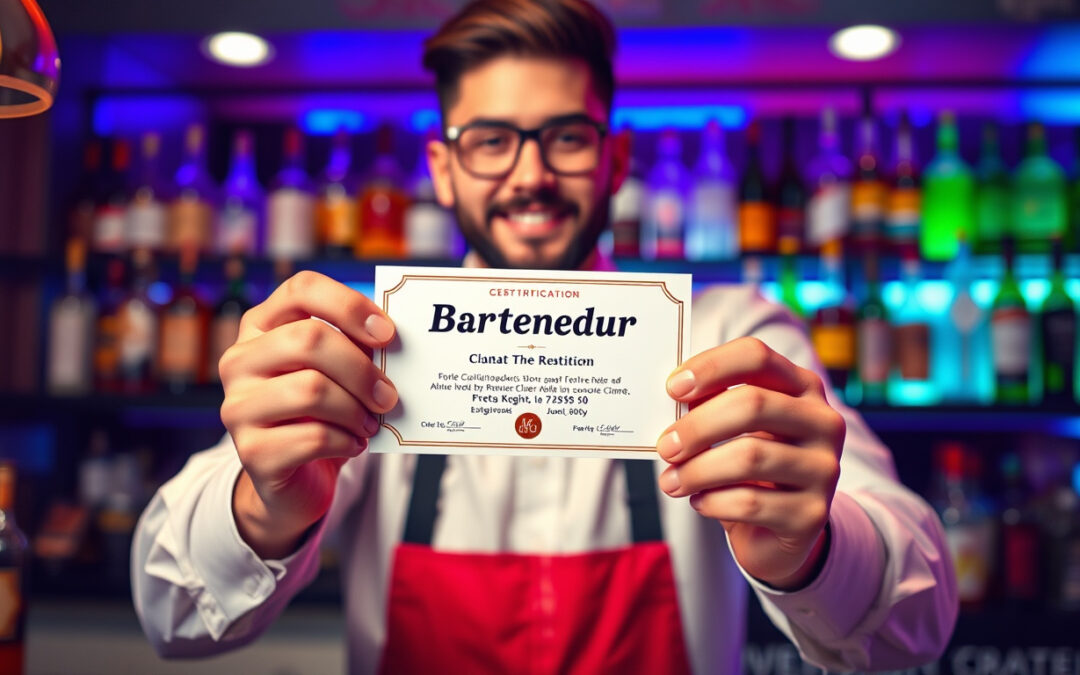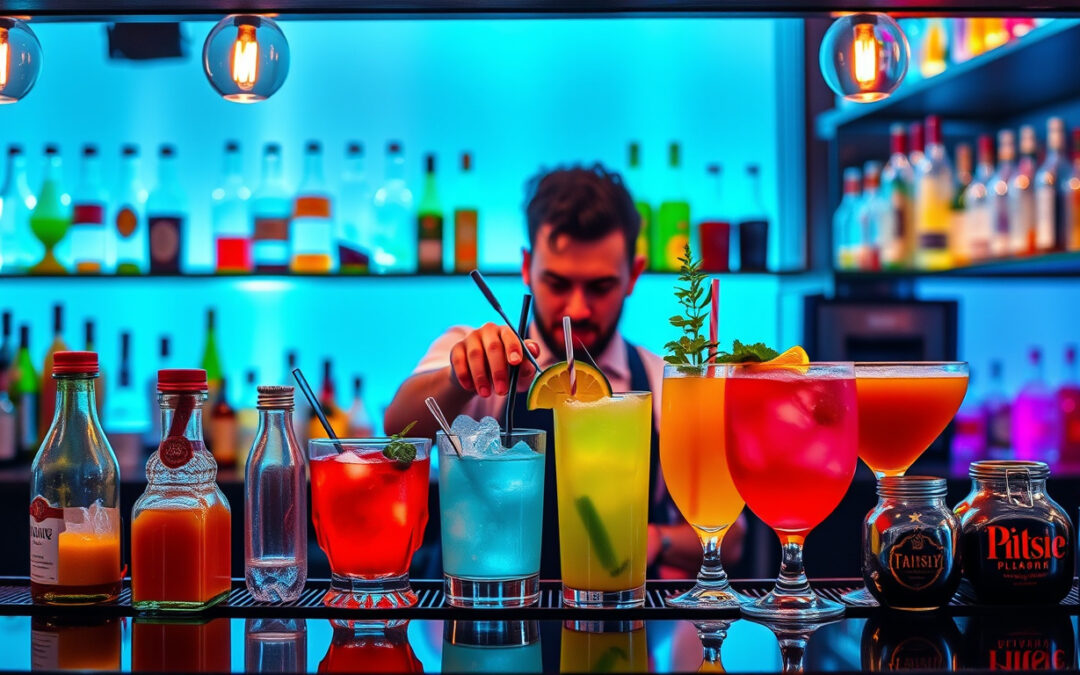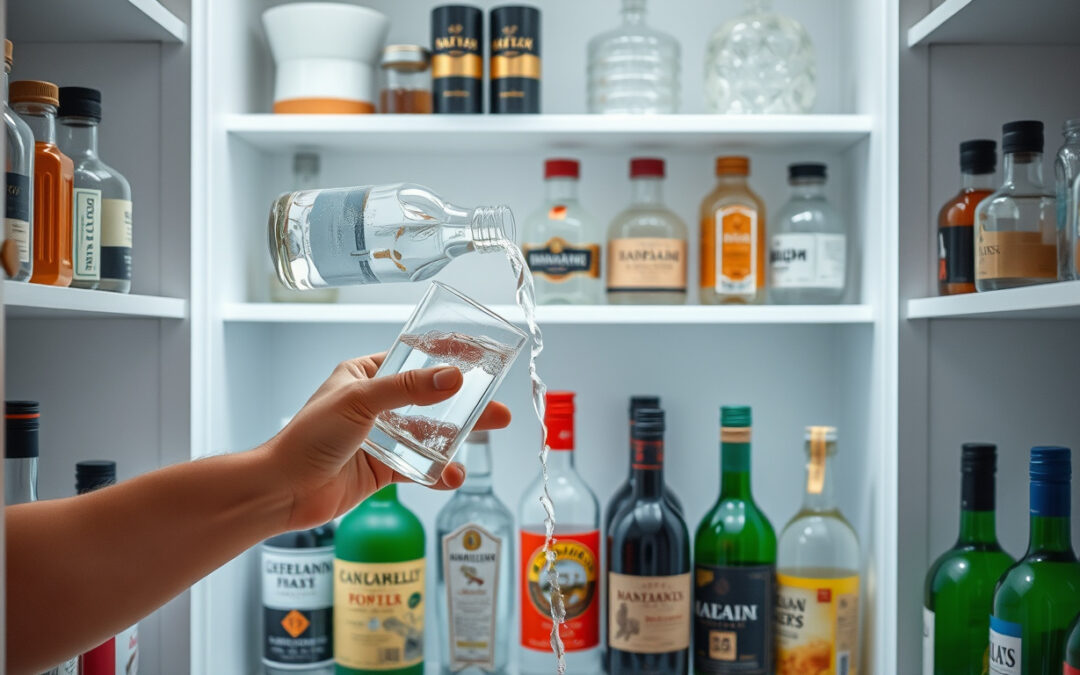
BLOG
Getting your bartender certification is an essential step if you want to work professionally behind the bar. Not only does it ensure you understand responsible alcohol service, but it also boosts your credibility and job prospects. If you’re eager to start your bartending journey and want to know how to obtain your bartender certification quickly and easily, you’re in the right place. This guide will walk you through the necessary steps, tips to expedite the process, and everything else you need to know.
Why Is Bartender Certification Important?
Before diving into the process, it’s important to understand why bartender certification is essential. Many states and employers require proof of responsible alcohol service to prevent underage drinking, intoxication, and alcohol-related incidents. Additionally, having a bartender certification:
- Demonstrates your commitment to responsible service.
- Enhances your employability in competitive job markets.
- May qualify you for higher-paying positions.
- Ensures compliance with legal regulations.
In some states, serving alcohol without proper certification can lead to legal penalties or suspension of your license to serve.
Understanding the Requirements for Bartender Certification
The process for obtaining bartender certification varies depending on your location. While some states do not require formal certification, others mandate specific training courses. Common requirements include:
- Minimum age eligibility (usually 18 or 21).
- Completion of a state-mandated alcohol training program.
- Passing a certification exam.
- Background checks in certain cases.
Because regulations differ, it’s crucial to verify your state’s specific requirements. You can find this information through your state’s alcohol beverage control board or equivalent agency.
1. Research State-Specific Regulations
Start by identifying your state’s legal requirements for bartender certification. Visit the official website of your state’s alcohol regulatory agency or department of licensing. This research will clarify whether you need certification, what courses are accepted, and if there are any local restrictions.
2. Choose a Reputable Training Program
Once you know the requirements, select a certification course that fits your needs. There are many online and in-person options designed to be quick and comprehensive. Look for programs that are approved or recognized by your state’s authorities.
Tips for choosing a training program:
- Accreditation: Ensure the course is certified by relevant authorities.
- Format: Opt for online courses if you need flexibility.
- Reviews: Check reviews and testimonials for credibility.
- Cost: Consider affordability but avoid courses that seem suspiciously cheap.
Popular providers include the Alcohol Drug Awareness Certification from recognized organizations such as TIPS or the ServSafe Alcohol program.
3. Complete the Training Program Efficiently
Online courses are often the fastest way to gain certification. These typically involve:
- Watching instructional videos.
- Reading relevant materials.
- Passing a final exam.
Most courses can be completed at your own pace, allowing you to fit training into your schedule.
4. Pass the Certification Exam
After completing the coursework, you’ll need to pass a test to prove your knowledge. These exams are usually multiple-choice and cover topics like:
- Laws and regulations.
- Recognizing intoxication.
- Handling intoxicated customers.
- Checking IDs for age verification.
- Managing difficult situations responsibly.
Prepare by reviewing all course materials and practicing sample questions if available.
5. Obtain and Download Your Certification
Once you pass the exam, you’ll typically receive a digital certificate. Many programs provide a printable card or certificate that you should keep handy as proof of your bartender certification.
6. Keep Your Certification Up-to-Date
Many agencies require recertification every 1-3 years, often through online refresher courses or additional training. Staying current ensures you remain compliant with regulations and provides ongoing knowledge about responsible service.
Tips to Speed Up the Certification Process
- Prioritize online courses for instant access and flexible completion.
- Check for accelerated programs boasting quick completion times.
- Gather necessary documents beforehand (ID, proof of age, payment info).
- Schedule exams promptly after completing coursework to avoid delays.
- Set a dedicated study schedule to stay on track.
Essential Checklist
| Step |
Action Item |
Estimated Time |
| 1 |
Research local requirements |
30 minutes |
| 2 |
Sign up for approved course |
10 minutes |
| 3 |
Complete training modules |
2-4 hours (self-paced) |
| 4 |
Pass the exam |
30 minutes to 1 hour |
| 5 |
Download or receive certificate |
Immediate or within 24 hours |
Following these steps methodically can make the process straightforward and swift.
Additional Tips for Aspiring Bartenders
- Gain Practical Experience: Consider volunteering or working as a barback to familiarize yourself with the environment.
- Develop Customer Service Skills: A friendly attitude coupled with responsible service can set you apart.
- Stay Informed About Local Laws: Laws surrounding alcohol service can change, so stay updated.
Frequently Asked Questions About BartenderCertification
1. How long does it take to get bartender certification?
Most online courses can be completed within a few hours, and the entire process — including passing the exam — can often be achieved within a day or two if you dedicate focused time. Course duration varies depending on your schedule and the program.
2. Is bartender certification legally required everywhere?
No, not in all states or countries. Some areas do not require formal certification, but many jurisdictions and employers strongly recommend or mandate it to promote responsible alcohol service.
3. Can I get bartender certification online?
Absolutely! Many reputable providers offer online bartender certification courses, making it easier to obtain your credentials quickly from the comfort of your home.
Conclusion
Obtaining your bartender certification quickly and easily is achievable with proper planning and the right resources. Start by understanding your local requirements, then select a reputable, approved training program—preferably online for maximum convenience. Dedicate sufficient time to complete the coursework and pass the exam, and you’ll be ready to serve responsibly in no time. Remember, staying informed about responsible alcohol service not only protects your patrons but also advances your career. With these tips, you’ll be well on your way to becoming a certified, professional bartender.

For more detailed information, check out the TIPS Alcohol Certification for a widely recognized program.
Remember: Responsible service is key to a successful bailiwick in the bartending profession. Cheers to your new career!

BLOG
In today’s interconnected world, consumers are more aware than ever about the impact their purchasing choices have on society and the environment. Enter ResponsibleMarketplace, a paradigm shift that emphasizes ethical shopping and conscious consumerism. Embracing responsible shopping not only aligns your financial actions with your values but also has the power to transform your overall consumer experience. This article explores what responsible marketplace practices entail, their benefits, and how you can become a more ethical shopper.
Understanding ResponsibleMarketplace
ResponsibleMarketplace refers to a marketplace where transactions and business practices prioritize social responsibility, environmental sustainability, and fair labor standards. It’s a movement away from purely profit-driven transactions towards a more ethical approach to purchasing goods and services.
This concept promotes transparency and accountability among brands and vendors, encouraging consumers to support companies that demonstrate a genuine commitment to ethical principles. From eco-friendly products to fair-trade certifications, responsible marketplace practices influence how we buy, sell, and think about consumption.
Why ResponsibleMarketplace Matters
The importance of embraci ng a responsible marketplace is multifaceted:
- Environmental impact: Ethical shopping reduces carbon footprints and minimizes waste.
- Social justice: Ensures fair wages and decent working conditions.
- Economic fairness: Promotes equitable trade practices and supports local communities.
- Consumer empowerment: Allows shoppers to influence corporate behavior positively.
Recent studies emphasize that consumers increasingly prefer brands that demonstrate responsibility—leading to a shift in marketplace dynamics (source). This trend underlines that responsible shopping isn’t just morally commendable; it’s also commercially advantageous.
How ResponsibleMarketplace Transforms Your Consumer Experience
1. Greater Transparency and Trust
Responsible marketplaces are built on transparency. Customers can access information about how products are made, sourced, and shipped. Knowing a brand’s practices fosters trust and makes shopping a more reassuring experience.
2. Enhanced Quality and Sustainability
Products in responsible marketplaces often emphasize durability and eco-friendliness. Brands committed to sustainability prioritize high-quality ingredients and ethical manufacturing processes, leading to longer-lasting items and reduced environmental impact.
3. Increased Customer Engagement
Ethical shopping invites consumers to participate more actively in the supply chain. Many brands engage customers via storytelling, showing behind-the-scenes processes and promoting responsible practices. This creates a deeper connection and loyalty.
4. Ethical Purchasing Opportunities
Responsible marketplaces often feature fair-trade, organic, cruelty-free, and locally-sourced products. Shopping within these parameters ensures you’re supporting ethical standards and fostering positive change.
5. Positive Societal Impact
Choosing responsible options contributes to broader societal benefits, like fighting climate change, reducing exploitation, and supporting underprivileged communities. Each purchase becomes an act of activism.

Key Principles of ResponsibleMarketplace
To understand how responsible shopping reshapes the consumer experience, it’s essential to recognize foundational principles:
- Fair Labor Practices: Ensuring workers earn fair wages and work in safe conditions.
- Environmental Sustainability: Minimizing waste, pollution, and resource depletion.
- Transparency: Clear communication about sourcing, manufacturing, and business practices.
- Local and Ethical Sourcing: Supporting local economies and sustainable supply chains.
- Animal Welfare: Avoiding products tested on animals and supporting cruelty-free options.
Practical Ways to Engage with ResponsibleMarketplace
Becoming an ethical shopper involves mindful and informed choices. Here’s how you can enhance your responsible shopping experience:
1. Research Brands and Certifications
Look for certifications such as Fair Trade, B Corp, Organic, Rainforest Alliance, and USDA Organic. These indicators help verify a company’s commitment to responsible practices.
2. Prioritize Local and Small Businesses
Shopping locally supports community economies and often reduces environmental impacts associated with shipping.
3. Read Product Labels Carefully
Pay attention to ingredient lists, sourcing information, and eco-labels to ensure the product aligns with your values.
4. Use Ethical Shopping Apps and Platforms
Leverage digital tools that curate responsible products, such as Good On You, Ethical Consumer, or Thrive Market.
5. Advocate and Share Your Experience
Be vocal about your values. Share your responsible purchases and encourage others to participate in ethical shopping.
Top 5 Benefits of Shopping on a ResponsibleMarketplace
- Environmental Preservation: Reduced waste and lower carbon emissions through eco-conscious products.
- Social Equity: Supporting fair wages and decent working conditions worldwide.
- Product Longevity: Higher quality products that last longer, saving money over time.
- Peace of Mind: Confidence in the integrity of your purchases.
- Positive Change: Contributing to systemic improvements in global trade and sustainability.
Challenges Faced in Embracing ResponsibleMarketplace
While the benefits are compelling, there are hurdles to adopting ethical shopping practices:
- Higher Cost: Responsible products may be priced higher due to fair wages and sustainable materials.
- Limited Availability: Ethical options might not be readily accessible everywhere.
- Information Gaps: Difficulty verifying the claims made by some brands.
- Lack of Awareness: Consumers may not know how to identify responsible products.
Overcoming these challenges requires education, advocacy, and supportive marketplace innovations.
How Companies are Leading the Charge
Many brands are integrating responsible marketplace principles into their operations:
- Implementing transparency initiatives: Sharing supply chain data openly.
- Obtaining sustainability certifications: Demonstrating verified responsible practices.
- Emphasizing corporate social responsibility (CSR): Investing in community projects and environmental initiatives.
- Innovating eco-friendly products: Using renewable resources and reducing plastic packaging.
According to a report by Nielsen, 66% of consumers are willing to spend more on products from companies committed to positive social and environmental impact (source). This changing consumer sentiment encourages more brands to align with responsible marketplace standards.
The Future of ResponsibleMarketplace
As awareness grows, the responsible marketplace is poised to become the standard. Advancements in blockchain transparency, increased regulation, and technological innovation will make ethical shopping easier and more trustworthy. Digital marketplaces are increasingly integrating ethical filters, making it seamless for consumers to find responsible products.
Additionally, Millennials and Gen Z are leading the charge, advocating for systemic change through their purchasing power. This generational shift indicates that responsible marketplace practices will become even more integral to consumer culture.
FAQ About ResponsibleMarketplace
1. What is meant by ResponsibleMarketplace?
ResponsibleMarketplace refers to a marketplace where buying and selling prioritize ethical, sustainable, and socially responsible practices, ensuring that consumers support brands committed to positive impact.
2. How can I participate in responsible marketplace shopping?
You can participate by researching brands’ ethical standards, choosing products with reputable certifications, supporting local businesses, and advocating for transparency and sustainability in your community.
3. Why is ethical shopping important in a responsible marketplace?
Ethical shopping in a responsible marketplace fosters environmental sustainability, promotes fair labor practices, supports local economies, and aligns your consumer behavior with your moral values.
Conclusion: Transforming Consumers into Change-Makers
The rise of ResponsibleMarketplace reflects a fundamental shift in how consumers view their role in global commerce. Ethical shopping is no longer a niche but a necessity in fostering sustainable development and social justice. By consciously choosing responsible products and supporting transparent brands, you not only elevate your consumer experience but also contribute to positive change worldwide.
Embracing responsible marketplace practices empowers you to shop confidently, knowing your purchases align with your values and drive societal progress. The future of commerce is ethical, sustainable, and responsible—are you ready to be part of it?

BLOG
In the world of hospitality, retail, and event management, understanding alcohol liability is essential for legal protection and operational success. When serving or selling alcohol, businesses face significant risks related to alcohol liability — the legal responsibility for damages caused by intoxicated patrons. This article explores what alcohol liability means, how it affects businesses, and the steps organizations can take to manage these risks effectively.
What Is Alcohol Liability?
Alcohol liability refers to the legal obligation that a business holds when its actions contribute to harm caused by intoxicated individuals. It encompasses various scenarios — from injuries sustained in an accident after alcohol consumption to legal claims arising from excessive drinking. Essentially, if a business is found negligent in preventing alcohol-related harm, they may be held financially responsible.
Why Does Alcohol Liability Matter for Businesses?
The importance of alcohol liability stems from potential legal, financial, and reputational consequences. For example, if a customer leaves an establishment intoxicated and causes a car accident, the business could face lawsuits, hefty fines, or license sanctions. Moreover, managing alcohol liability helps foster safer environments, reduce legal risks, and uphold a responsible reputation.
Legal Basis for Alcohol Liability
Alcohol liability laws differ across jurisdictions but generally fall into two categories:
-
Dram Shop Laws: These laws permit injured parties to sue alcohol vendors, such as bars or restaurants, if they served alcohol to someone visibly intoxicated or underage, and that person caused harm.
-
Social Host Laws: These hold individuals or organizations, like private hosts at a party, liable if they served alcohol to minors or visibly intoxicated guests resulting in injury.
These laws aim to discourage irresponsible service and promote accountability in alcohol sales and service.
Impact of Alcohol Liability on Businesses
Understanding the implications of alcohol liability is critical for any business involved in alcohol service. Let’s examine how it can impact operations:
-
Legal and Financial Risks: Businesses can be sued for damages resulting from alcohol-related incidents, leading to significant financial liabilities through settlements, judgments, or increased insurance premiums.
-
Operational Changes: To minimize liability, businesses often implement training programs, strict ID checks, and policies aimed at responsible alcohol service.
-
Reputation and Customer Trust: Responsible alcohol service enhances customer trust and community standing, while violations or incidents can tarnish a brand’s image.
-
Regulatory Compliance: Many local and state agencies enforce alcohol laws, with penalties for violations including fines, suspension, or revocation of licenses.
Managing Alcohol Liability: Best Practices
To mitigate alcohol liability, businesses should adopt comprehensive strategies that emphasize responsible service and legal compliance:
1. Employee Training and Certification
Invest in training programs such as TIPS (Training for Intervention Procedures) or ALEA (Alcohol and Licensed Establishment Accreditation). Well-trained staff are better equipped to identify signs of intoxication and intervene responsibly, reducing liability.
2. Implement Strict ID Policies
Always verify age with valid identification to prevent underage sales. Enforce a zero-tolerance policy for serving minors.
3. Create and Enforce Responsible Service Policies
Develop clear policies outlining how to handle intoxicated patrons, including stopping alcohol service to visibly intoxicated guests. Post policies visibly for staff.
4. Maintain Accurate Record-Keeping
Keep detailed records of alcohol sales, incident reports, and staff training sessions. These records can be vital in defending against legal claims.
5. Carry Adequate Liability Insurance
Secure comprehensive liquor liability insurance to protect your business financially from alcohol-related claims. Insurance providers assess your risk profile and advise on coverage limits.
6. Engage in Community Education
Partner with local authorities to promote responsible drinking and patron safety. Community engagement can improve public perception and reduce incidents.
7. Regularly Review and Update Policies
Laws and best practices evolve, so regularly update your policies to stay compliant and mitigate emerging risks.

The Role of Insurance in Alcohol Liability Management
Liability insurance is a crucial safeguard for businesses serving alcohol. It covers legal costs, settlements, or judgments associated with alcohol-related incidents. Choosing the right policy involves scrutinizing coverage limits, exclusions, and claim procedures. Consult insurance professionals who specialize in liquor liability to tailor coverage to your specific operations.
Case Study: How a Bar Reduced Alcohol Liability Risks
A local bar in a bustling downtown area faced frequent incidents of intoxicated patrons leaving and causing accidents. After implementing mandatory bartender training, strict ID checks, and a policy to cut off service at signs of intoxication, the bar saw a significant decrease in legal claims. Additionally, they purchased liquor liability insurance to cover unforeseen incidents. As a result, the business experienced fewer incidents, protected its reputation, and fostered a safer community environment.
Key Takeaways
- Alcohol liability is a significant legal risk for businesses serving alcohol, encompassing situations where negligence leads to harm.
- Laws like dram shop and social host laws hold vendors and hosts accountable for serving alcohol irresponsibly.
- Implementing responsible service policies, training staff, maintaining records, and acquiring appropriate insurance are key strategies to mitigate liability.
- Regularly reviewing policies and engaging with the community support ongoing risk management.
Frequently Asked Questions About Alcohol Liability
Q1: How does alcohol liability affect my business insurance premiums?
Answer: Businesses with higher risks of alcohol-related incidents typically face increased insurance premiums. Implementing responsible service practices and maintaining good records can help lower premiums and improve coverage options.
Q2: Can I be held liable if a customer drinks outside my business and causes harm?
Answer: Generally, social host laws apply to private parties, not licensed businesses. However, if your business’s irresponsible service contributed to the intoxication, liability can be established under dram shop laws.
Q3: What precautions can I take to reduce alcohol liability in my establishment?
Answer: Some key precautions include staff training, strict ID verification, refusing service to intoxicated patrons, documenting incidents, and carrying adequate liquor liability insurance.
Conclusion
Understanding alcohol liability is vital for maintaining legal compliance, safeguarding financial assets, and fostering a safe environment for patrons and employees alike. By implementing responsible service policies, staying informed about legal obligations, and carrying appropriate insurance, businesses can effectively manage and reduce their alcohol liability risks. Prioritizing responsibility not only protects your bottom line but also enhances your reputation within the community.
For more detailed guidance and legal specifics, consult local regulations and industry authorities or legal counsel specializing in hospitality law.
(Source: Insurance Information Institute)— https://www.iii.org/article/liquor-liability-insurance

BLOG
Essential Tips for Successful Bartender Training Courses
Embarking on a career in the beverage and hospitality industry requires more than just a friendly smile and a good memory for drink recipes. If you’re serious about becoming a skilled bartender, enrolling in a comprehensive bartendertraining course is a crucial step. These courses provide foundational knowledge, technical skills, and confidence needed to excel behind the bar. Whether you’re just starting or looking to upgrade your skills, understanding how to maximize your bartendertraining experience can make all the difference.
This article explores essential tips for successful bartendertraining courses, ensuring you get the most out of your learning journey.
Why Is Proper Bartender Training Important?
Bartendertraining serves multiple purposes. It equips aspiring bartenders with knowledge on mixology, customer service, alcohol laws, and safety procedures. A well-structured course can set you apart in a competitive industry and open doors to better job opportunities.
Moreover, effective training minimizes common mistakes, such as improper pouring or unsafe alcohol service, which could lead to legal issues or customer dissatisfaction. According to industry experts, thorough bartendertraining is the foundation of a successful and responsible bartending career (source).
Choose the Right Bartender Course
Selecting the appropriate bartendertraining course is the first step toward success. Not all courses are created equal, so consider the following factors:
- Accreditation and Certification: Ensure the course is recognized by reputable industry organizations or licensing bodies.
- Curriculum Depth: Look for comprehensive modules covering everything from drink recipes to responsible alcohol service.
- Trainer Expertise: Instructors should have substantial industry experience and teaching credentials.
- Practical Components: Hands-on practice is vital. Choose courses that include real-world experience behind a bar.
- Reviews and Reputation: Check reviews from past students to gauge course quality.
Prepare Ahead of Time
Preparation enhances your ability to absorb and apply new knowledge. Before your bartender training course begins, you should:
- Read basic beverage theories or literature about spirits, beers, and wines.
- Familiarize yourself with local alcohol laws and regulations.
- Note down your goals for the course, such as mastering specific cocktail recipes or learning customer service skills.
Being prepared demonstrates dedication and allows you to engage more deeply during your training sessions.

Engage Actively During Training
Active participation during your bartendertraining course can significantly influence your learning curve. Engage by:
- Asking questions to clarify concepts.
- Participating in practical exercises.
- Observing peers to learn different techniques.
- Taking thorough notes to reinforce your learning.
Remember, the more you involve yourself, the better you’ll retain the material, leading to increased confidence behind the bar.
Practice Regularly
Theory is vital, but practice is what turns knowledge into skill. During and after your bartender training:
- Rehearse cocktail recipes repeatedly to develop muscle memory.
- Practice pouring techniques to improve speed and accuracy.
- Simulate customer interactions for better communication skills.
- Seek feedback from trainers or peers to identify areas for improvement.
Consistent practice solidifies techniques, making your service more efficient and professional.
Develop a Personal Style
While learning standard recipes and techniques is essential, developing your personal style can set you apart. Observe industry trends, experiment with presentation styles, and cultivate your bartender personality. This authenticity can enhance customer experience and foster repeat business.
Focus on Customer Service Skills
Excellent bartenders are also exceptional communicators. Enroll in customer service training modules if available, or focus on:
- Active listening.
- Empathy and friendliness.
- Handling difficult customers professionally.
- The art of upselling drinks tactfully.
Superior customer service leads to better tips, higher tips, and more loyal patrons.
Stay Updated on Industry Trends
The beverage industry continuously evolves with new cocktails, techniques, and equipment. To stay ahead:
- Attend industry workshops and seminars.
- Follow leading bartenders and industry publications.
- Experiment with new ingredients and recipes.
- Adapt your skills to incorporate innovative trends.
Continuous learning ensures your bartendertraining remains relevant and comprehensive.
Obtain Necessary Certifications and Licenses
Depending on your location, certain certifications or licenses may be mandatory to serve alcohol legally. Ensure your bartendertraining course provides documentation that satisfies local regulations. This demonstrates professionalism and readiness to work in licensed venues.
FAQs About BartenderTraining
Q1: How long does a typical bartendertraining course take?
The duration varies—from intensive weekend workshops to comprehensive multi-week programs. Basic courses might be completed in as little as a few days, while advanced certifications could take several weeks.
Q2: Is bartendertraining necessary for entry-level bartenders?
While some employers hire without formal training, having certified bartendertraining significantly improves job prospects, safety, and confidence behind the bar.
Q3: Can bartendertraining help me open my own bar?
Absolutely. Beyond skills, training provides valuable industry insights, business tips, and networking opportunities that are crucial when starting your own venture.
Conclusion
Mastering the art of bartending isn’t solely about knowing drink recipes—it’s about embodying professionalism, safety, and excellent service. Choosing the right bartendertraining course and following these essential tips can dramatically improve your skills and confidence. Remember, successful bartendertraining lays the foundation for a thriving career in a vibrant, ever-evolving industry.
Invest in your education today, and you’ll be mixing drinks with mastery and confidence tomorrow!
For further insights into the importance of quality bartendertraining, visit the detailed industry resource here.

BLOG
In today’s fast-paced world, managing alcohol consumption effectively is vital for maintaining overall wellness. Alcohol management encompasses a range of practices aimed at reducing health risks, improving mental clarity, and fostering healthier lifestyle choices. Whether you’re looking to cut back, learn moderation, or understand the impacts of alcohol on your body, adopting effective strategies can lead to significant improvements in your quality of life.
Understanding Alcohol Management: Why It Matters
Alcohol management is not about complete abstinence for everyone but about making informed, mindful choices regarding alcohol consumption. Excessive drinking can lead to numerous health issues, including liver disease, cardiovascular problems, mental health disorders, and even increased risk of certain cancers. Furthermore, unmanaged alcohol intake can impair judgment and increase the likelihood of accidents or risky behaviors.
By implementing effective alcohol management strategies, individuals can enjoy social activities responsibly without jeopardizing their health. Responsible management also supports emotional well-being, productivity, and healthier relationships.
Key Components of Effective Alcohol Management
Successful alcohol management involves a combination of awareness, planning, and behavioral change. Here are some core components to consider:
-
Setting Realistic Goals: Decide whether you want to reduce your intake, achieve alcohol-free days, or eliminate alcohol altogether. Setting specific goals helps create a clear path forward.
-
Tracking Consumption: Keeping a diary of daily alcohol intake provides insight into habits and can highlight patterns that need adjustment.
-
Educating Yourself: Understanding the recommended alcohol limits and health risks associated with excessive drinking can motivate better choices. For example, the CDC suggests that moderate drinking is up to one drink per day for women and up to two for men.
-
Developing Healthy Alternatives: Engage in activities like exercise, hobbies, or socializing without alcohol to fulfill similar emotional or social needs.
-
Creating a Support System: Share your goals with trusted friends, family, or join support groups such as Alcoholics Anonymous to strengthen accountability.
Practical Strategies to Enhance Alcohol Management
Implementing practical tactics can make alcohol management more manageable and sustainable. Here are some effective strategies:
1. Establish Alcohol-Free Zones and Times
Designate specific days or times when you abstain from alcohol completely. For instance, aim for alcohol-free weekdays or set a specific time in social settings when you stop drinking.
2. Practice Mindful Drinking
Mindfulness involves paying attention to your body’s signals and understanding why you want to drink. Before reaching for a drink, ask yourself if you’re genuinely hungry for a social connection or emotional relief.

3. Use Non-Alcoholic Alternatives
Enjoy non-alcoholic beverages that mimic the taste and experience of alcohol, such as sparkling water with a twist of citrus or non-alcoholic beers and wines.
4. Limit Accessibility
Keep only a limited amount of alcohol at home or avoid purchasing in bulk. Reducing availability can decrease impulsive drinking.
5. Plan Your Drinks
Set a limit before going out, such as two drinks max, and stick to it. Use a counting app or tally to stay within your goals.
6. Seek Professional Guidance
If you find it challenging to manage alcohol intake independently, consult healthcare providers who can offer personalized advice, counseling, or medical treatment options.
The Role of Education and Awareness in Alcohol Management
Awareness is crucial in effective alcohol management. Educating yourself about how alcohol affects different organs and systems in the body can reinforce commitment to drinking responsibly. For instance, understanding that alcohol impacts sleep quality, heart health, and mental health underscores the importance of moderation.
The Centers for Disease Control and Prevention (CDC) emphasizes that responsible alcohol management can prevent many health-related issues, improve mental health, and enhance overall quality of life (source). Moreover, public health campaigns and resources can support individuals in developing healthier drinking habits.
Benefits of Effective Alcohol Management
Adopting a responsible approach to alcohol can yield numerous benefits, including:
- Improved physical health and reduced risk of chronic diseases.
- Better mental health and emotional stability.
- Enhanced sleep quality.
- Stronger personal and professional relationships.
- Increased productivity and focus.
Remember, moderation and mindfulness are at the heart of successful alcohol management.
Common Challenges and How to Overcome Them
Despite best intentions, managing alcohol can be challenging due to social pressures, cravings, or emotional triggers. Here are some common obstacles and strategies to address them:
- Social Pressure: Prepare polite responses to offers of drinks or choose alcohol-free social activities.
- Cravings: Identify triggers such as stress or boredom; substitute with healthier alternatives like exercise or meditation.
- Emotional Triggers: Seek support from mental health professionals or support groups to navigate emotional issues without turning to alcohol.
Frequently Asked Questions About Alcohol Management
1. What are some effective alcohol management techniques for beginners?
For those new to alcohol management, starting with setting clear goals, tracking consumption, and practicing mindful drinking are foundational steps. Engaging in alcohol-free activities and seeking support can also reinforce positive habits.
2. How can I reduce my alcohol intake without feeling deprived?
Gradually decrease consumption, replace alcoholic drinks with enjoyable non-alcoholic options, and focus on the positive health benefits. Celebrate milestones and avoid labeling abstinence as deprivation to foster a healthy mindset.
3. Is it safe to completely stop drinking alcohol?
Yes, for many individuals, abstinence is safe and beneficial. However, if you have been a heavy drinker or have underlying health conditions, consult a healthcare professional before stopping alcohol abruptly. Support systems and medical guidance can facilitate safe cessation.
Conclusion
Effective alcohol management is a vital component of fostering better wellness. By setting realistic goals, educating yourself, practicing mindfulness, and seeking support when needed, you can enjoy the benefits of responsible drinking and improved health. Remember, moderation and awareness are your best allies in maintaining a balanced, fulfilling life.
Taking proactive steps toward alcohol management not only enhances physical health but also nurtures emotional resilience and personal growth. Start today by evaluating your habits and implementing these strategies to pave the way for a healthier, happier future.
For more information on alcohol-related health guidelines, visit the Centers for Disease Control and Prevention.











